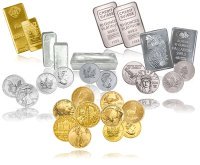What Types of Investments are You Buying?
With so many different types of investments in the world today, it's no wonder people have a hard time figuring out where to start. It's easy to see why people only feel safe with stocks, bonds, and MAYBE real estate.After all, those three investment typed CAN be used to make money safely. And they probably represent a majority of most people's net worth.
But that's just a small sample of the choices available for your safe investing process. Just like there are many different ways of investing money, there are many different types of investments that you can use. Your goal is to find the ones that fit into your safe investing process.
What are the Different Types of Investments?
Let's go back to the definition of investing; it's exchanging money for an asset today, with the expectation that you'll exchange that asset back for more money tomorrow (or at the very least the same amount of money you paid today).So an investment is the vehicle you're using the move your money into the future. Picking the "right" investments means finding the ones that will help you meet your investing goals while fitting into your safe investing process.
Since performance varies based on market conditions, you'll want to make sure some are up when others are down, and vice versa. That is the basic principle behind diversification.
Asset prices that move in the same direction, at the same time, are correlated. And if all of your investments are correlated, that means your portfolio is low on diversification.
So the quickest way to get a feel for correlation and diversification is to group your investments by asset class. There are 4 main asset classes:
- Real or Physical Assets & Property
- Financial Assets
- Financial Derivatives & Contracts
- Insurance Contracts
Real Assets
Real assets are the "raw materials" are starting point for producing income and wealth. They're called "real" because they're physical objects or materials. For this asset class, supply and demand can be used to monitor market conditions. In fact, I'm sure you see or experience the impact of supply and demand all the time when you drive by gas station signs.There are several types available to investors, each with its own set of characteristics. Click each link to go to the respective pages:
- Commodities
- Oil/Natural Gas
- Grains
- Coffee
- Pork Bellies
- Soybeans
- Precious Metals
- Gold Investment
- Silver Investment
- Platinum Investment
- Palladium Investment
- Intellectual Property
- Copyrights
- Trademarks
- Patents
- Real Estate

Financial Assets
Financial assets are issued by corporate entities and governments, representing claims on the income and wealth generated by real assets. You'll also hear these assets referred to as "paper" assets. In this category, financial markets can be used to monitor investing conditions.
- Equities (i.e. Stock Investments)
- Debt (i.e. Bond Investments)
- Agency
- Treasury
- Corporate
- Municipal Bonds
- Savings Bonds
- Funds
- Mutual Funds
- Exchange Traded Funds
- Hedge Funds
- Cash Equivalents
- Savings Accounts
- Checking Accounts
- Money Market Accounts
- Certificates of Deposit/CDs
- Currencies
- Trusts
- Partnerships
Derivative Contracts
As the name implies, derivatives are contracts grant you the "right" to own real or financial assets. Their value is "derived" from the value of the underlying asset (gold, oil, stock indexes, equities, etc.). Here, you'll want to monitor the market conditions of the underlying asset.
- Futures
- Options
- Swaps
- Forward Contracts
Insurance & Reinsurance Contracts
Insurance is a risk management tool that allows you to protect certain investments. You pay a premium today to protect future value. As with derivatives, monitoring the market conditions associated with the future value of the underlying asset is key.
- Vehicle
- Home insurance
- Health
- Unemployment
- Casualty
- Life (Term and Whole)
- Property
- Liability
- Credit
- Treaty and Facultative Reinsurance
- Proportional and Non-Proportional Reinsurance
You may have read the above and thought, what is the market condition for health or life insurance? It's you...you should monitor your health. Your state of being will determine the cost/price/value of your health insurance. Same goes for credit insurance...your financial health is the condition to watch.
Financially Engineered Assets
In the past, access to many of the aforementioned assets was restricted to high net worth individuals. With the advent of exchange traded funds, financial institutions could replicate the price performance of physical asset classes (e.g. commodities) without having to move around the actual physical product.These funds opened the door to an entirely new world of asset allocation strategies for individual investors like you and me:
- Inverse Funds
- Managed Futures
- Leveraged Funds
- Commodities
- Currencies
- Hedge Funds
- Long/Short Funds
- International & Emerging Market Funds
Other Types of Investments
Let's not forget investments in something other than "asset classes". Your education is a massively important asset...and one you need to continually invest in, be it money or time.Educating yourself, whether it's formally through degrees or informally at the local library, will always be a smart type of investment. And the information you need has NEVER been more accessible in human history. It's mind-blowing to think how much access/opportunity we have to better ourselves.
- Formal Degrees
- Books
- Online courses
- Websites
- Podcasts
- Trade Journals
- Personal & Professional Relationships
The Bottom Line
At a high level, you can use the asset classes to figure out which market condition is important to monitor. For instance, supply and demand may be a key factor for a commodity like gold, but unimportant for an insurance contract.But this doesn't occur in a vacuum. As market conditions change, so does your level of diversification. You can invest in several types of investments, across several asset classes, without achieving true diversification because your allocation to each one is unbalanced. Check out the asset allocation page for more info.



